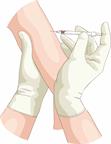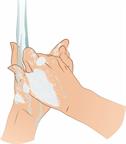EsteéoconteúdodoPacientEngagement
O que acontece quando o paciente vai para casa?
Saiba mais sobre nossos produtos de Patient Engagement agora! Transforme seus pacientes em participantes ativos em seus cuidados de saúde, dando a eles acesso fácil às mesmas informações baseadas em evidências em que você confia - mas fornecidas em um formato fácil de entender.
Influenza, also known as the flu, is an infection caused by a germ called a virus. It affects your respiratory system, which includes your nose, throat, windpipe, and lungs. The flu causes cold symptoms, as well as a high fever and body aches.
The flu is contagious, which means it spreads easily from person to person. You're more likely to get it during flu season, which goes from December to March. You can get the flu by:Lifestyle
Keep your body's immune system strong. To do this:Do not use any products that contain nicotine or tobacco. These products include cigarettes, chewing tobacco, and vaping devices, such as e-cigarettes. If you need help quitting, ask your health care provider.
Medicines
 Get a flu shot each year. It's the best way to prevent the flu. Remind your parents to take you to your provider, a local clinic, or a pharmacy for the flu shot.
Get a flu shot each year. It's the best way to prevent the flu. Remind your parents to take you to your provider, a local clinic, or a pharmacy for the flu shot.Most young people who have the flu get better by resting at home and drinking lots of fluids. You or your parents may ask your provider if you should take any cold medicines.
There's also a medicine called an antiviral that may lessen your symptoms and make the flu go away faster.General information
 Practice good health habits. Good habits are key during flu season.
Practice good health habits. Good habits are key during flu season.This information is not intended to replace advice given to you by your health care provider. Make sure you discuss any questions you have with your health care provider.
Cookies são usados neste site. Para recusar ou saber mais, visite nosso conheça nosso aviso de cookies.
Copyright © 2025 Elsevier, its licensors, and contributors. All rights are reserved, including those for text and data mining, AI training, and similar technologies.